

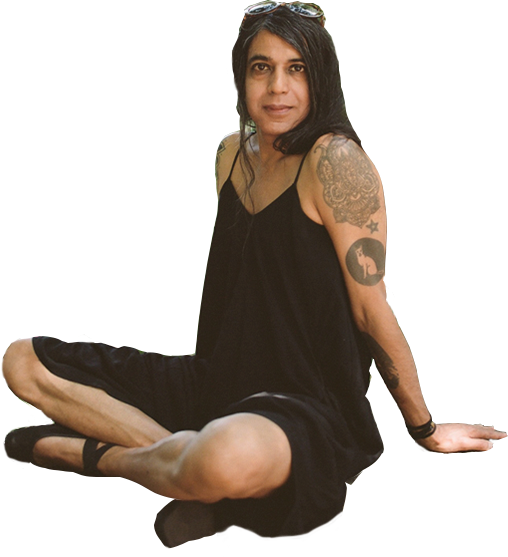
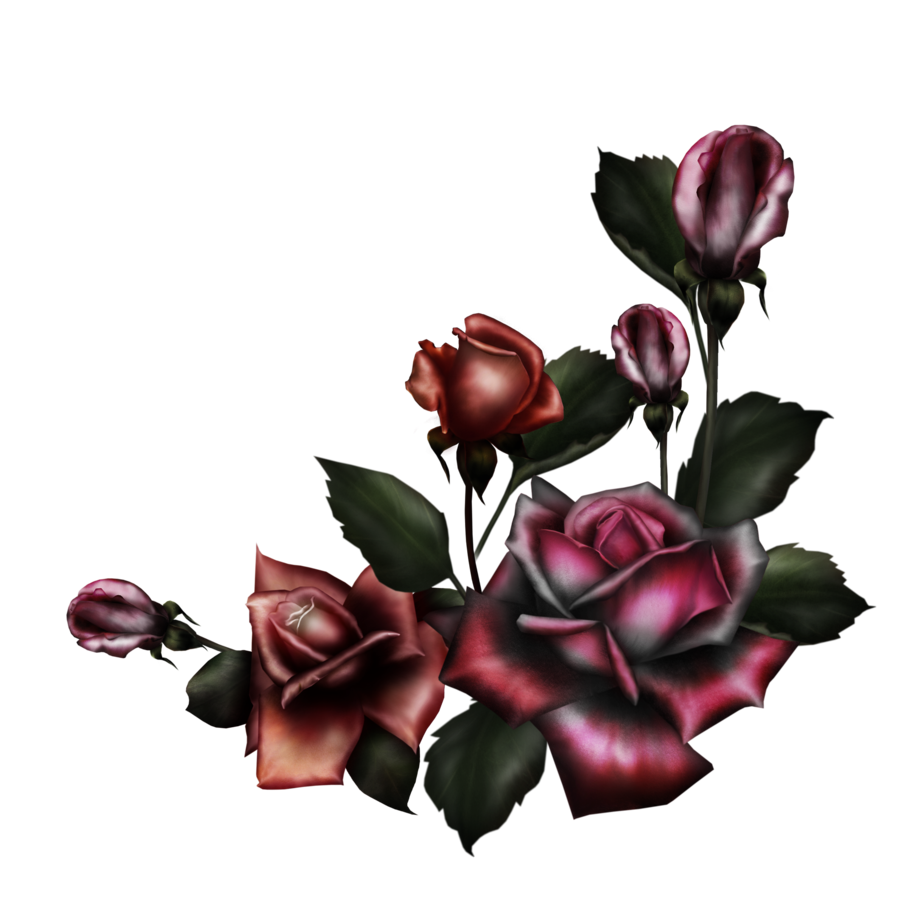
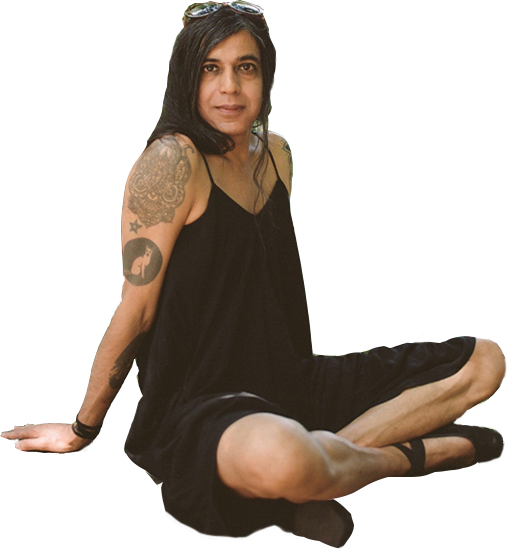
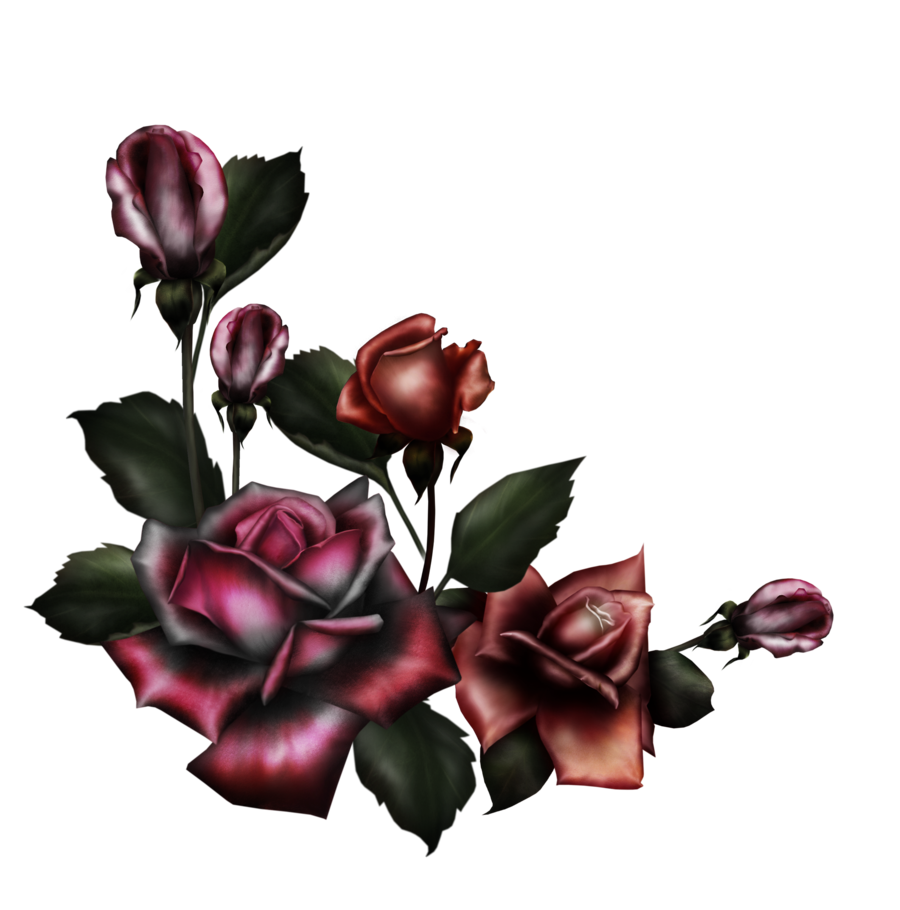
she/her
picture by Shriya Samavai

GROWING UP, my parents made me take Bengali lessons and we would always go to Bengali pujas in New Jersey or Long Island. Beyond that, they were also interested in Bengali music. There were always songs of Tagore at home. I happily played along with it at the time, but I only took the memories of that more seriously once they were gone. When I was growing up or when I was younger than this, I would sort of shy away from wearing clothes that mark you from a certain place. By going back to these clothes that I never wore, it was a way of trying to bring that sense of comfort and belonging back to life. Of course at that time, I also never wore those kinds of clothes because they would have been too feminine.
ALONG WITH DISCOVERING my transness, I became more interested in reimmersing myself and wondering what it means to be South Asian. It was when we went back to India in 2016 that I started to wonder what it would be like to start wearing salwar kameezes or kurtas, and I started wearing my hair in braids. And I think I recognized something in that that I hadn't before. Those clothes and that kind of appearance suited me somehow, and I think other Desi people recognized that as well. And I felt an ease, which was more important to me than the feedback.
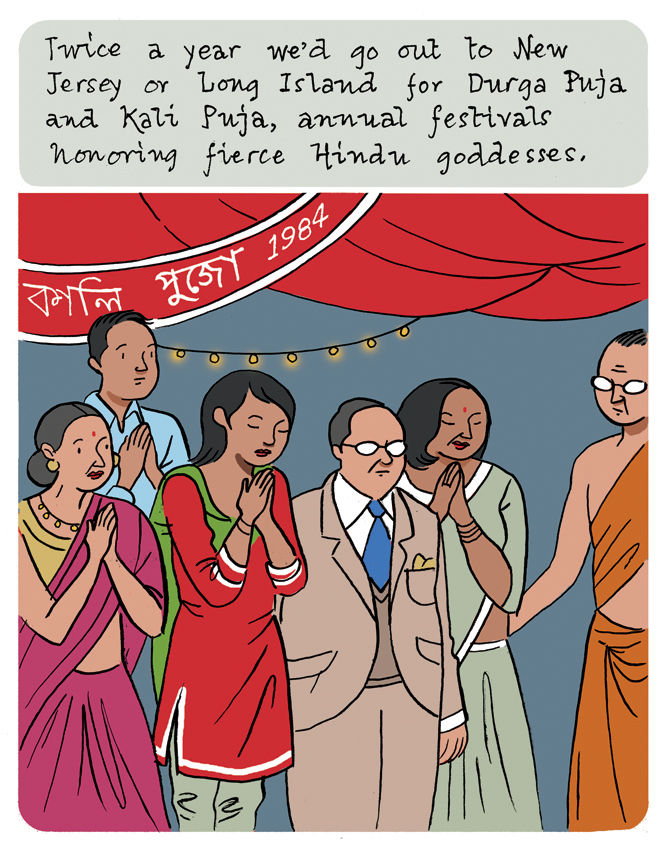
> Even if it was tenuous and even if it was something of an illusion, I felt like an identity was really beginning to coalesce.


What allowed me to be me before I was trans was being goth – which I still feel like I am. But that caused some friction with mom and dad because, well, for the obvious reasons, they thought I looked ridiculous, but they also thought I looked like a girl. Why do you want to look like a girl, that's what Mom always said to me. At the time I thought – even though this is not something I could say to her – that's not what I'm aiming for, this is just an aesthetic that pleases me and happens to be quite femme. But I think whatever friction we had was probably the same friction a lot of parents have with their kids who are rebelling or adopting a subcultural identity.

> I guess my main feeling, if you can call it that, before I really came out was that I didn't even know there was a possibility for someone like me to say that I was trans.


I had a very rigid idea of what trans meant. I thought that you had to medically or chemically alter yourself or that you have to have some kind of major transformation in order to say that you are trans. I haven't really done any of those things. I've always kind of been this way under one guise or another. But I never called myself trans because I really didn't know what I was. I don't know if I was happy to do that, but I just didn't know any better to than be undeclared, or to just use whatever pronouns were attached to me.
But after a while, after meeting some trans people who assumed I was trans, that’s when I started to feel like that was a possibility and more so maybe, it was already a reality that I was unaware of. That's when I was like, this makes so much sense and I'm feeling a lot more comfortable not using the pronouns that were assigned to me. Things seemed to align mentally with me for the first time.
At the beginning I was using gender neutral pronouns because I wanted to just dip a toe into the water. And eventually even that seemed wrong because that's not even who I am. I am a femme.

MY WORK AS an artist and writer is also a way for me to reconnect or connect to things that I found to be very fleeting. I wonder why I want to always go back to a place or a time or a culture or a memory that doesn't exist. I don't go back that often to India and when I did, it was always at a distance. So what is it that I'm always trying to capture? I think, in a way, that thing that I'm trying to capture is in itself an illusion. The only way I can make any sense of it is to write it or to draw it or to propose it in an imaginary space, which maybe is okay, because our reality is too complicated and too problematic.
Sometimes, though, my work is just a question of wanting to see that kind of representation out in the world. I think it's really important to put trans stories out there that are real and I don't want to say positive, because it makes it sound like a greeting card or something, but…stories that are not based on trauma. I think the more trans creators that are out there, the more there will be multiple narratives that are not based on tragedy or trauma or one’s queerness being the point of conflict.
> I think the work of the imagination is really important.

It took a while and it was very twisty and turny to get to a point where I can say, hey, I’m an artist and now I can also admit that I'm a writer, which is a funny thing to say because I never thought I could call myself that.
It was circumstance that led to my trans identity being uncovered. So much of it seems unplanned, contrary to the sort of traditional narrative of ‘trans awakening.’ So looking forward, I think that will continue to be the case and those are things that I can't necessarily foresee. I also feel that as a person of a certain age, I feel okay. I think a lot of folks who are trans regret that they didn't transition or come out earlier, but I feel like I'm actually looking forward to seeing what becoming older is like. I feel OK with who I am at the age that I am. I am completely embracing being an aunty, or as some of the queer South Asian kids in Kensington (a neighborhood in Brooklyn) call me, ‘gothic aunty.’
BISHAKH SOM (she/her) is a graphic novelist and writer, whose work explores themes of gender, sexuality, memory, and urbanism, amongst other things. She had two graphic novels out in 2020: Apsara Engine, a collection of eight short stories published by The Feminist Press and Spellbound, a graphic memoir published by Street Noise Books. She was born in Addis Ababa and grew up in New York City, where she still lives. You can follow her journey here.